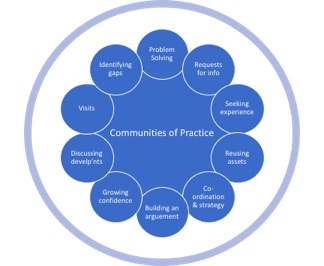 In 2018, we conducted a short online survey to capture the thoughts and strategies of individuals and organisations involved in public engagement with research in the UK. Over 70 individuals and organisations replied, including university researchers, practitioners, NGOs, policy teams, public engagement support teams and community groups. We asked them about their future involvement in public engagement and citizen science, and what it could be. Here we present some of the key themes that emerged from their answers to two of the questions. You can find details on the barriers and challenges here.
In 2018, we conducted a short online survey to capture the thoughts and strategies of individuals and organisations involved in public engagement with research in the UK. Over 70 individuals and organisations replied, including university researchers, practitioners, NGOs, policy teams, public engagement support teams and community groups. We asked them about their future involvement in public engagement and citizen science, and what it could be. Here we present some of the key themes that emerged from their answers to two of the questions. You can find details on the barriers and challenges here.
Question 1: What are the benefits to you and/or your organisation of belonging to (and being supported by) a national community of practice around public engagement with environmental research?
Four key benefits could be identified
1. Knowledge Sharing
This was the most common answer among our respondents, with over half stating that knowledge sharing would be a key benefit of a community of practice. This could be in sharing experiences, case studies, data, challenges, and ideas around best practice.
2. Resource Sharing
Being able to share resources was seen as an important benefit of a national community, and would enable individuals and organisations to tackle current difficulties regarding finite resources. Though our respondents largely did not specify particular resources, this point was often linked to other benefits of knowledge sharing, saving time, and avoiding the duplication of efforts.
3. Engagement
A national community was highlighted as an important solution to reaching wider audiences and extending the geographical reach of projects and organisations. In addition, there may be opportunity for greater ‘impact’ by working with different communities or ‘disadvantaged’ groups. This wider reach could also increase volunteer numbers for citizen science projects. Yet not only would such a community have an impact on involvement, but the type of involvement, with respondents noting the potential increase in motivation, enthusiasm, and confidence.
4. Funding
In our previous blog post, we demonstrated that funding was a key concern for our respondents. A national community of practice was viewed by a number of respondents as a benefit, enabling organisations to have access to external funding, to gain further knowledge about available funding streams, and to improve bid-writing through partnerships and collectives.
A community of practice was seen by the majority of respondents as an important and beneficial way of furthering public engagement and improving current approaches to citizen science in environmental research, with opportunities to share ideas, improve personal and professional development, and to ultimately better environmental outcomes.
Question 2: In an ideal world what could you or your organisation contribute to a national community for public engagement with environmental research?
Our respondents suggested:
1. Knowledge
Two thirds of our respondents said that they could offer some form of knowledge to a community of practice. This could be:
- knowledge gained through experience (to help future projects with best practice, to meet challenges, and see opportunities)
- specialist knowledge (for example, marine monitoring)
- location or environment specific knowledge
2. Enthusiasm and Energy
A number of respondents highlighted the importance of ‘passionate’ practice in public engagement and citizen science work, and noted that they could bring this enthusiasm and energy to a national community of practice.
3. Technology
A number of answers noted that technology could be a potential contribution, highlighting the importance of technological integration, the use of smartphone apps and social media, and as a way to engage younger citizens.
4. Funding access
Some respondents said that they could offer access to funding (not necessarily directly, but through collaboration and partnerships).
In sum
Our survey has not only shown the potential benefits and opportunities afforded by a national community of practice for public engagement and citizen science in environmental research, but has highlighted the wealth of knowledge, resources, and enthusiasm that the individuals and organisations involved could bring to such a community, engendering new opportunities for collaboration, sharing, and participation.
Acknowledgements
The project team thank all those who participated in this survey.
